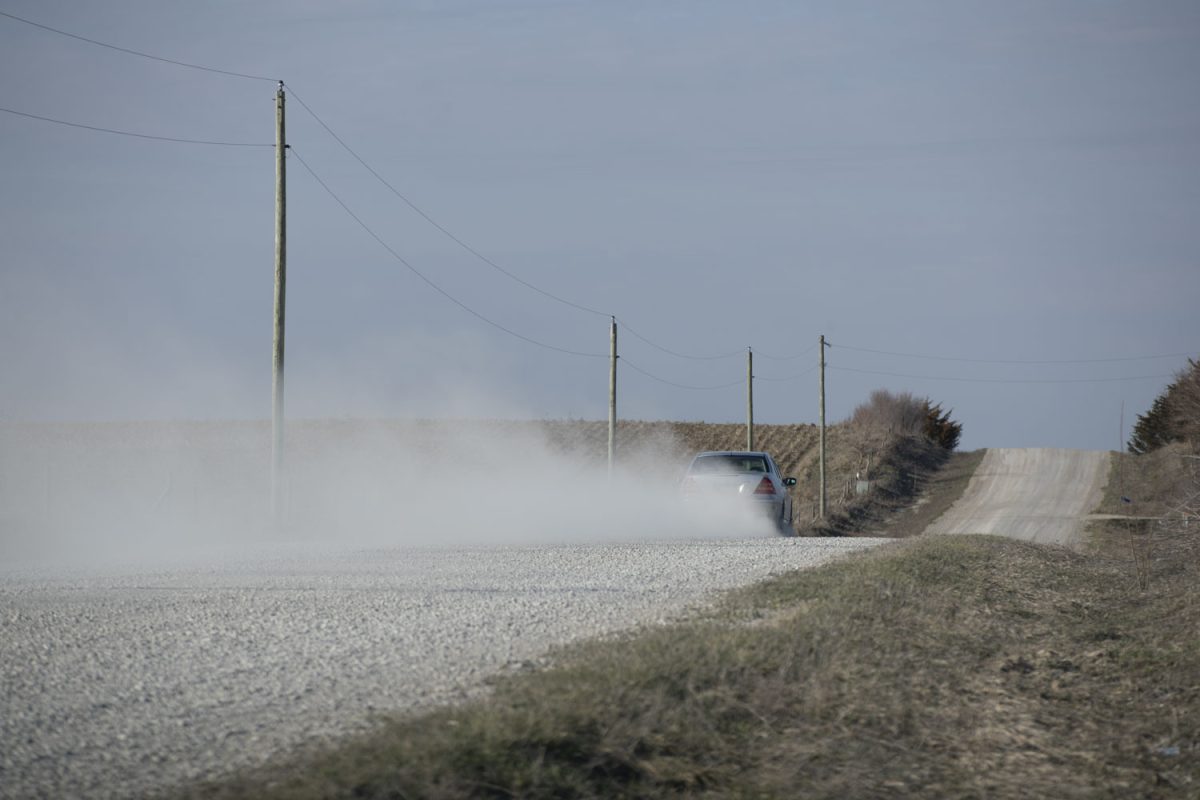Johnson County resident James Shymansky spends hundreds of dollars each year on something that many Iowans living in rural areas face: Dusty roads.
Shymansky said he and his 13 neighbors spent over $7,000 to put dust control treatments on their shared road. After multiple Johnson County citizens expressed safety concerns about the dust from untreated dirt and gravel roads, the Board of Supervisors approved nearly $1 million toward dusty road treatments.
The supervisors approved a $727,670 contract on March 21 to L.L. Pelling Company, Inc. to be used for the 2024 Bituminous Resurfacing Program. The board also awarded a $333,047 contract to Binns & Stevens for the 2024 Dust Control Safety Program at the same meeting. Linn County’s government next door also provides residents with dust control services, including seal coat.
The county secondary roads department requests yearly dust control alleviation on heavily trafficked roads to help control dust. The 2024 Bituminous Resurfacing Program performs maintenance on the county’s network of chip seal roads.
Ed Bartels, an assistant county engineer, said Johnson County oversees the maintenance of over 700 roads, all a mixture of gravel, dirt, and pavement.
This maintenance can be time-consuming and expensive but is needed to provide treatment on dangerously dusty roads, Bartels said. Without dust treatment, it can become dangerous for cars due to lack of visibility and bothersome to people living on said roads.
The county has tested several dust treatments but currently utilizes a calcium chloride solution that covers dirt and gravel roads with chemicals to lessen dust buildup and debris. The county’s most successful dirt treatment option has been a chip-seal solution, which is a layer of asphalt that covers the road, Bartels said.
Although these treatments help reduce dust problems, they are expensive. Bartels said the treatments are funded by taxpayers and county-funded sources that largely derive from the sales tax on cars and gas.
Bartels said Johnson County also invests in putting down new rocks on different roads across the county, spending millions each year.
Through public comment at a supervisors meeting, citizens said these dusty roads have become hazardous for young children and bikers who cannot see through the large dust clouds.
Brent Schneider, a new resident of Johnson County, said he invested in chipseal on his property to prevent dust from flying around while his children play outside.
“All I can think of is the land that the kids can run around, enjoying the county life,” he said. “That’s why it was an easy investment for us to do the chipseal so that they can run outside and someone can drive by without covering them in dust.”
Despite these concerns, Schneider did not want to keep up with the costly maintenance of covering his road each year and asked to partner with the board to provide more dust maintenance.
Eric Postman, another Johnson County resident, said he works for a contracting company and dust problems have prevented them from finding work because people find the dust is inconvenient.
At the board meeting, Postman advised at the board meeting that the county offer more paved roads to give people more options to live in rural areas without dust.
“I’ve watched just amazing people come into this community and maybe get lucky and find a nice rural spot on hard surface roads that they could build on,” Postman said. “There are really few and far between now even when people are still trying to develop land in this area.”
Bartels said maintaining over 900 miles of roads can be expensive and difficult to take care of, which is why the county is not able to provide dust treatment on all roads.
“If we were to try to chipseal all of them, we’d break the bank here,” Bartels said. “They have a lot of other priorities they need to take care of, so that’s the primary reason a lot of our rock roads are untreated.”



